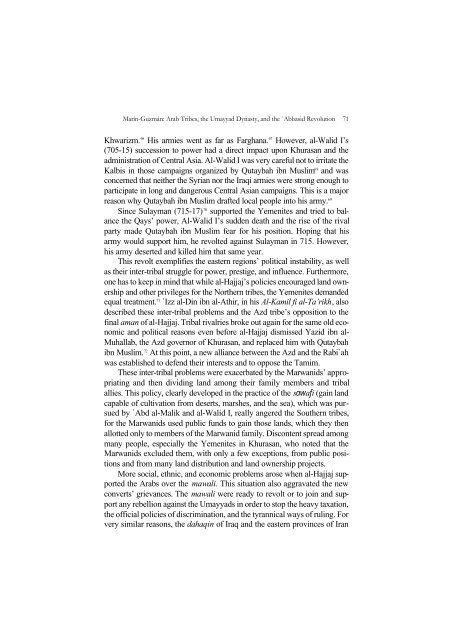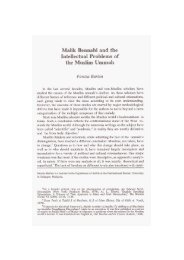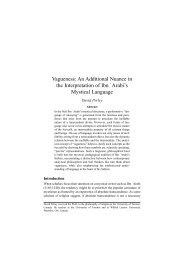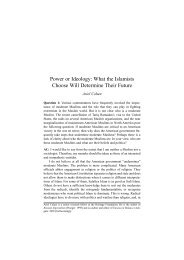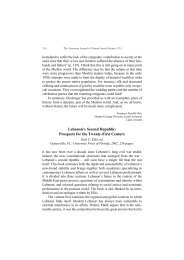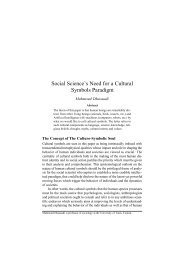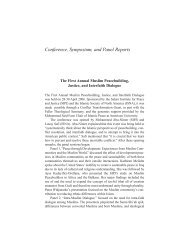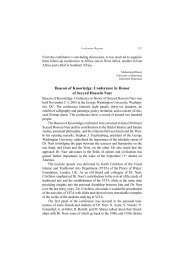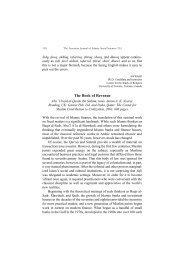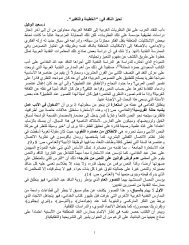Arab Tribes, the Umayyad Dynasty, and the `Abbasid ... - Epistemology
Arab Tribes, the Umayyad Dynasty, and the `Abbasid ... - Epistemology
Arab Tribes, the Umayyad Dynasty, and the `Abbasid ... - Epistemology
Create successful ePaper yourself
Turn your PDF publications into a flip-book with our unique Google optimized e-Paper software.
Marín-Guzmán: <strong>Arab</strong> <strong>Tribes</strong>, <strong>the</strong> <strong>Umayyad</strong> <strong>Dynasty</strong>, <strong>and</strong> <strong>the</strong> <strong>`Abbasid</strong> Revolution 71<br />
Khwarizm. 66 His armies went as far as Farghana. 67 However, al-Walid I’s<br />
(705-15) succession to power had a direct impact upon Khurasan <strong>and</strong> <strong>the</strong><br />
administration of Central Asia. Al-Walid I was very careful not to irritate <strong>the</strong><br />
Kalbis in those campaigns organized by Qutaybah ibn Muslim 68 <strong>and</strong> was<br />
concerned that nei<strong>the</strong>r <strong>the</strong> Syrian nor <strong>the</strong> Iraqi armies were strong enough to<br />
participate in long <strong>and</strong> dangerous Central Asian campaigns. This is a major<br />
reason why Qutaybah ibn Muslim drafted local people into his army. 69<br />
Since Sulayman (715-17) 70 supported <strong>the</strong> Yemenites <strong>and</strong> tried to balance<br />
<strong>the</strong> Qays’ power, Al-Walid I’s sudden death <strong>and</strong> <strong>the</strong> rise of <strong>the</strong> rival<br />
party made Qutaybah ibn Muslim fear for his position. Hoping that his<br />
army would support him, he revolted against Sulayman in 715. However,<br />
his army deserted <strong>and</strong> killed him that same year.<br />
This revolt exemplifies <strong>the</strong> eastern regions’ political instability, as well<br />
as <strong>the</strong>ir inter-tribal struggle for power, prestige, <strong>and</strong> influence. Fur<strong>the</strong>rmore,<br />
one has to keep in mind that while al-Hajjaj’s policies encouraged l<strong>and</strong> ownership<br />
<strong>and</strong> o<strong>the</strong>r privileges for <strong>the</strong> Nor<strong>the</strong>rn tribes, <strong>the</strong> Yemenites dem<strong>and</strong>ed<br />
equal treatment. 71 `Izz al-Din ibn al-Athir, in his Al-Kamil fi al-Ta’rikh, also<br />
described <strong>the</strong>se inter-tribal problems <strong>and</strong> <strong>the</strong> Azd tribe’s opposition to <strong>the</strong><br />
final aman of al-Hajjaj. Tribal rivalries broke out again for <strong>the</strong> same old economic<br />
<strong>and</strong> political reasons even before al-Hajjaj dismissed Yazid ibn al-<br />
Muhallab, <strong>the</strong> Azd governor of Khurasan, <strong>and</strong> replaced him with Qutaybah<br />
ibn Muslim. 72 At this point, a new alliance between <strong>the</strong> Azd <strong>and</strong> <strong>the</strong> Rabi`ah<br />
was established to defend <strong>the</strong>ir interests <strong>and</strong> to oppose <strong>the</strong> Tamim.<br />
These inter-tribal problems were exacerbated by <strong>the</strong> Marwanids’ appropriating<br />
<strong>and</strong> <strong>the</strong>n dividing l<strong>and</strong> among <strong>the</strong>ir family members <strong>and</strong> tribal<br />
allies. This policy, clearly developed in <strong>the</strong> practice of <strong>the</strong> sawafi (gain l<strong>and</strong><br />
capable of cultivation from deserts, marshes, <strong>and</strong> <strong>the</strong> sea), which was pursued<br />
by `Abd al-Malik <strong>and</strong> al-Walid I, really angered <strong>the</strong> Sou<strong>the</strong>rn tribes,<br />
for <strong>the</strong> Marwanids used public funds to gain those l<strong>and</strong>s, which <strong>the</strong>y <strong>the</strong>n<br />
allotted only to members of <strong>the</strong> Marwanid family. Discontent spread among<br />
many people, especially <strong>the</strong> Yemenites in Khurasan, who noted that <strong>the</strong><br />
Marwanids excluded <strong>the</strong>m, with only a few exceptions, from public positions<br />
<strong>and</strong> from many l<strong>and</strong> distribution <strong>and</strong> l<strong>and</strong> ownership projects.<br />
More social, ethnic, <strong>and</strong> economic problems arose when al-Hajjaj supported<br />
<strong>the</strong> <strong>Arab</strong>s over <strong>the</strong> mawali. This situation also aggravated <strong>the</strong> new<br />
converts’ grievances. The mawali were ready to revolt or to join <strong>and</strong> support<br />
any rebellion against <strong>the</strong> <strong>Umayyad</strong>s in order to stop <strong>the</strong> heavy taxation,<br />
<strong>the</strong> official policies of discrimination, <strong>and</strong> <strong>the</strong> tyrannical ways of ruling. For<br />
very similar reasons, <strong>the</strong> dahaqin of Iraq <strong>and</strong> <strong>the</strong> eastern provinces of Iran


